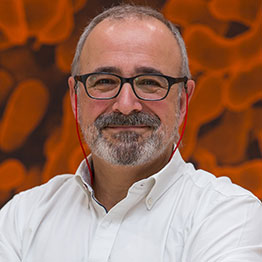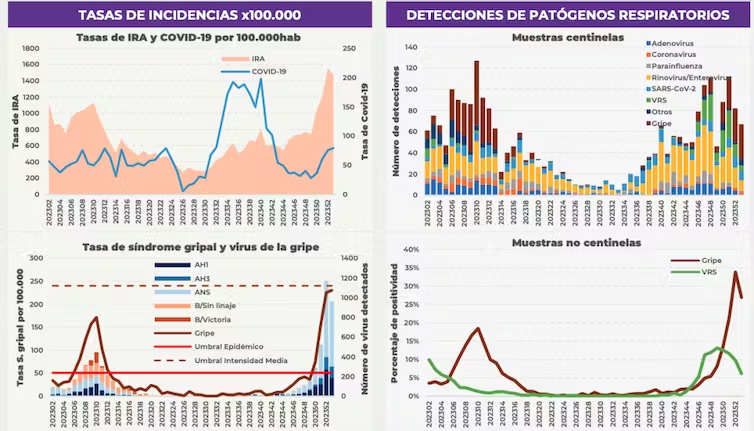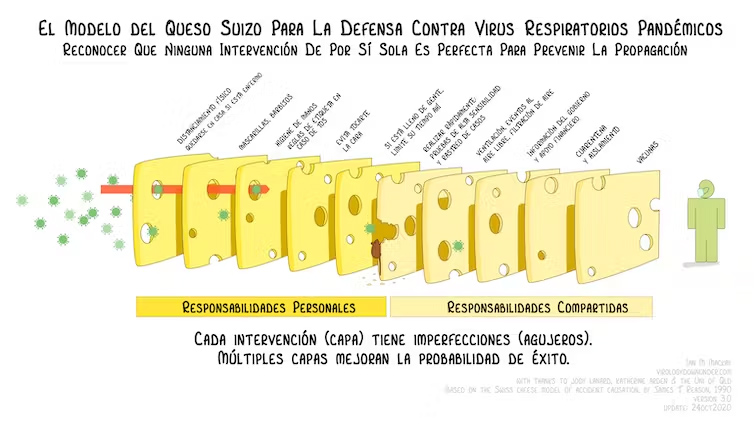10/01/2024
Published in
The Conversation Spain
Ignacio López-Goñi
Full Professor of Microbiology and director of the Museo de Ciencias Universidad de Navarra
 As of Wednesday, January 10, masks are once again mandatory in Spanish healthcare centers, a measure that has caused quite a stir in the media and in society in general. So, let's talk about viruses and masks.
As of Wednesday, January 10, masks are once again mandatory in Spanish healthcare centers, a measure that has caused quite a stir in the media and in society in general. So, let's talk about viruses and masks.
What status are we on?
We are dealing with the traditional seasonal epidemic of respiratory viruseswhich visit us every year (except during the pandemic) around this time, although this season has been brought forward a few weeks and, in principle, the peak is expected in the next few days.
Most cases are influenza, covid-19 and respiratory syncytial virus (RSV), but it is not a "tripledemia" as has been said in some media. In reality, it is a cocktail of respiratory viruses with other coronaviruses, rhinoviruses, parainfluenza, pneunoviruses, adenoviruses... There are hundreds of viruses that cause respiratory infection. There are no more viruses than before, they are the usual ones, although unfortunately this time we add to the list covid-19 (which, by the way, is still not seasonal like the rest and we "visit" several times a year).

According to the latest report of the Acute Respiratory Infection Surveillance System (Week 52/2023), influenza is circulating in Spain with greater intensity than the other respiratory viruses and is associated with fees of incidence in primary care and hospitalization in increasing ascent. The activity of covid-19 and RSV infection tends to stabilize in primary care.
Most cases are mild and self-limiting and do not require visit . Regardless of the virus, symptoms and treatment are very similar: analgesics and antipyretics, good hydration and nutrition and rest. In severe cases with respiratory distress, pain, persistent fever or other pathologies, a doctor should be consulted. The status therefore does not seem exceptional and being seasonal it was quite foreseeable.
All this is not to say that it is not important: let us remember that every year several thousand people die in Spain from respiratory infections or associated complications. In the group of infectious diseases, respiratory diseases cause the most deaths each year. Therefore, in general, more people die in winter than in summer.
Do face masks work?
Some claim that there is no scientific evidence that facemasks work. A systematic review on the use of physical interventions to reduce the spread of respiratory viruses concluded that there was no evidence of their effectiveness. However, this subject of reviews does not allow us to conclude that facemasks are not effective. A randomized clinical essay is not the best way to analyze the efficacy of facemasks.
To demonstrate experimentally its usefulness, it would be necessary to take two groups of people (numerous and homogeneous), one with and the other without mask (establishing the same subject of mask, time of use...), keep the two groups in the same environment with the virus, let them get infected and measure after a time of exhibition the issue of infected, sick and dead people. An experiment... impossible to do.
During the pandemic, the image of Swiss cheese became very popular to explain how to defend against a respiratory virus and to recognize that no single intervention is perfect in preventing the spread of the virus. Each intervention (or layer of cheese) has its imperfections (holes), but multiple layers improve the likelihood of success.
The mask alone will not prevent us from becoming infected - it will only reduce the probability - but if we combine it with hand hygiene, physical distance, avoidance of contact with people if we are infected, ventilation and air filtration, vaccinations... the probability of spreading the virus and getting sick will be much lower.

Facemasks are just another layer of Swiss cheese. It is obvious that they reduce the possibility of transmission of a pathogen that is transmitted through the air via aerosols when we talk, cough or sneeze. Would anyone think of proposing to remove them from staff sanitary on a operating room?
Should they be mandatory?
Unfortunately, the pandemic has left us with a tremendous politicization of health measures. In that we have not improved: being for or against masks or vaccines depends more on the color of the party, which perverts and hinders dialogue and consensus on such crucial issues.
In a status like the current one, with a large circulation of respiratory viruses and a high risk of infection, masks are highly recommended, especially for those with symptoms, vulnerable or living with them. Making facemasks mandatory in healthcare facilities now means that we have not done our homework before. It is a measure that comes late, it demonstrates a flaw in the system.
We have missed a golden opportunity to raise public awareness about the proper use of the mask, when to use it and why (you still sometimes see people alone in a car with it on or people wearing it outdoors and taking it off to greet and hug acquaintances). Sometimes it is more important how the message is given than the message itself. Explaining a measure taken by consensus can be more effective than a decree law.
Preparing for the next season
To reduce the effect of seasonal epidemics of respiratory viruses, we must act earlier: prevention.
Three basic ideas:
-
If you are in the recommended groups, get vaccinated against influenza and covid-19 in the fall.
-
Wear a mask with common sense and responsibility, out of solidarity, have good hand hygiene and avoid contact with people if you are infected.
-
If possible, improve ventilation and air quality.
Unfortunately, the structural, bureaucratic and management problems of the healthcare system continue. A few weeks ago, the assessment of the Performance of the Spanish National Health System in the face of the covid-19 Pandemic: Lessons from and for a Pandemic.. In a few weeks all this will no longer be news. To avoid a new collapse next respiratory virus season, it is now time to prepare the health system.
This article was originally published in The Conversation. Read the original.
![]()
